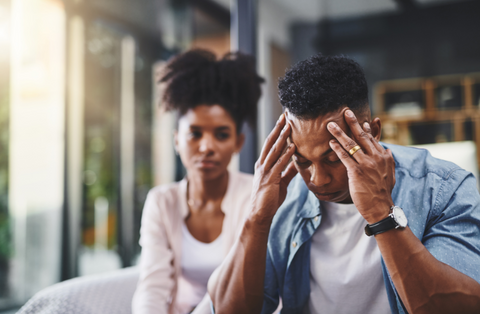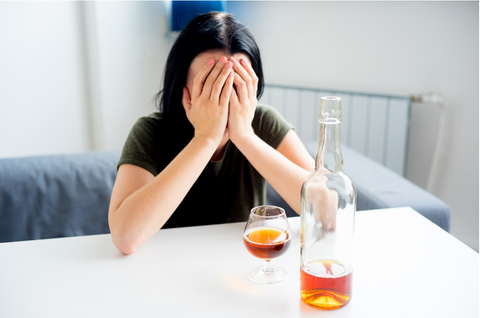Why Do I Feel Anxious After Drinking Alcohol?
Many people turn to alcohol as a means to cope with their anxiety, but what you might not realise is that alcohol can actually exacerbate anxiety symptoms in the long run.
A couple of drinks may be your go-to to help you relax at the end of a stressful day, however too much alcohol will have a detrimental impact on your mental health if you are consuming excessive quantities on a regular basis.
What Actually Is Alcohol?
Alcoholic drinks contain is a specific molecule known as ethanol. When you drink alcohol, ethanol molecules are absorbed into your blood and travel to virtually all parts of your body, including your brain. Alcohol is a toxic so your body has to work hard to get rid of it from your system.
Alcohol causes chemical changes in your brain. The brain then has to readjust as the alcohol wears off and when it's broken down by your body’s systems and metabolised within your body.

What Is Anxiety?
Anxiety is the feeling of overwhelm, nervousness, fear and worry and it's estimated that individuals with anxiety disorders are two to three times more likely to have an alcohol problem compared to those without anxiety.
There are many types of anxiety disorders, such as General Anxiety, Social Anxiety, Health Anxiety, OCD and Phobias, to name just a few. They all cause your body to go into what we call the ‘fight or flight’ mode, releasing hormones into your bloodstream to prepare you to react or run away from the perceived fear.
Anxiety can also cause physical symptoms too like feeling tired or burnt out, having trouble concentrating or staying focused, having headaches or tummy aches, as well as many others.

Is Anxiety Normal?
Most people feel anxious from time to time, it is our body’s way of keeping us safe. It’s a natural response and usually passes once the situation is over, for example after a job interview or an exam.
But if you have feelings of anxiety that are constant, overwhelming and affect your daily life, then it is known as an anxiety disorder.
If this sounds like you, there are things you can do and support is available to help you manage.

Why Is There A Connection Between Anxiety And Alcohol?
Alcohol is a depressant and has a negative impact on your brain and mental wellbeing.
When you consume alcohol, it slows down the central nervous system and initially produces a calming effect. This is why some people initially feel a sense of relief from their anxiety symptoms when they drink alcohol.
However, over time, if you regularly drink heavily, the central nervous system gets used to the suppressing effect of the alcohol, which means your brain is affected if the alcohol level suddenly drops. You can then go straight into ’fight or flight’ mode as the alcohol leaves your system; the exact same reaction as anxiety.

Alcohol can induce anxiety and panic because of its effects on GABA, a chemical in the brain that normally has a relaxing effect. Continued alcohol use can disrupt the balance of brain chemicals and neurotransmitters that regulate mood and anxiety. As a result, anxiety symptoms may worsen or become more frequent.
So because of the way alcohol interferes with your ‘fight or flight’ response, excessive drinking can make you more vulnerable to anxiety disorders, and make symptoms worse. It becomes a catch 22, trying to use alcohol to relieve anxiety, whilst at the same time increasing anxiety.
What is Alcohol Tolerance?
With prolonged use, the body develops a tolerance to alcohol, requiring increased amounts to achieve the same calming effect. This can often lead to a dangerous cycle where people consume more and more alcohol to alleviate their anxiety, but also end up increasing their risk of addiction and dependence.

How Does Alcohol And Anxiety Affect Sleep?
Alcohol is also known to disrupt sleep patterns.
While it may initially help people to fall asleep faster, the actual quality of sleep is usually not good quality. This can lead to increased anxiety and depression the following day, as sleep deprivation is closely linked to heightened anxiety levels.
Alcohol Is Not A Solution To Anxiety
It's important to acknowledge that alcohol should never be used as a long-term solution for managing stress and anxiety. Instead, it's crucial to develop healthier coping mechanisms that address the root causes of anxiety.
Whilst you may need an anxiety specialist to help you understand the reasons why you may be struggling with anxiety, there are strategies that you can use yourself that will alleviate anxiety in the moment.
Healthy Strategies To Alleviate Anxiety
- Exercise produces the happy hormones that will help improve your mood and reduce your anxiety. Even better if you are able to exercise in nature
- Progressive muscle relaxation works because it releases the physical tension you feel in your body when you are anxious
- Practicing gratitude reduces stress and anxiety and instead promotes more positive emotions
- Practicing deep belly breathing sends a signal to your brain that you are safe
- Mindfulness and meditation can be effective strategies to encourage a feeling of calm
- Getting a good nights sleep and having a regular bed time routine will reduce your anxiety

If You Need Further Support
If you need further support with your Mental Health, a trained Anxiety Specialist can prescribe a personalised plan to understand the root cause of anxiety, as well as help develop healthy coping strategies that are focused around your individual needs.
We have had great success helping clients manage anxiety without turning to alcohol, by understanding the root cause of their anxiety, recognising their negative thought patterns and replacing them with healthier, more resourceful ones.
Taking care of your mental health is an essential part of your overall well-being. Left unresolved, anxiety can spiral out of control and have a significant impact on relationships, work, school and family life.
So if you want to take the next steps to have a happier life where your fears no longer hold you back, click the link below and book a free no obligation consultation call.

Other Resources
Discover a fast way to Reduce Anxiety Right Now
Watch some Breathing Techniques to Reduce Anxiety
Read 5 Simple techniques to ease anxiety
How to have a Supportive Conversation about Mental Health
Download my eBook on Workplace Stress and Anxiety

Disclaimer
It's important to note that we are not medically trained professionals. If you or someone you know is struggling with alcohol abuse, please visit your GP and seek professional help.


